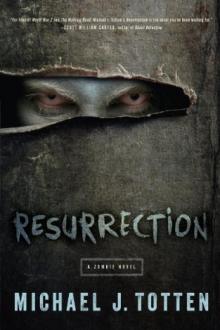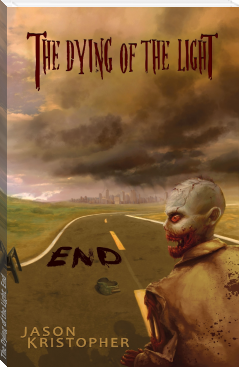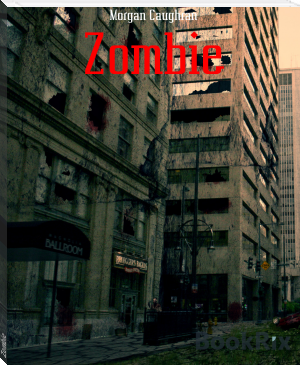Resurrection: A Zombie Novel by - (i love reading books TXT) 📖

- Author: -
- Performer: -
Book online «Resurrection: A Zombie Novel by - (i love reading books TXT) 📖». Author -
“The entire world is overrun with those things,” Kyle said, “and you want to make enemies out of us over a grocery store? Seriously? Almost everyone’s dead. Your biggest concern in a grocery store shouldn’t be six other people. It should be the expiration dates on those soup cans. What you need is a secure perimeter and people to help you figure out how to farm.”
Lane said nothing.
“Am I making sense here, Lane, or are you bound and determined to stay here while we go rebuild somewhere safe?”
Parker had to admit Kyle made sense, but Lane and his boys would still have to be dealt with. Kyle, too, would have to be dealt with one way or another. Surrendering to Lane was an act of towering asininity. It damn near got all of them killed. It still might get all of them killed.
Parker had no intention of going anywhere with Lane unless it was outside to the parking lot to beat him to death, but if the asshole would agree to Kyle’s plan for the time being, it would buy them some time. He didn’t know what was going to happen, exactly, but whatever it was, sailing to the San Juans with that crew was not it.
“Look,” Kyle said. “You guys aren’t exactly shaping up as our dream companions, but I’ll take you up to the islands if you chill out and give us our guns back. Because if you throw us out without weapons, we’ll die. And you’ll die, too, because you will never get to a truly safe place without me.”
The whole store was silent for a few moments.
“It’s not a half-bad idea, boss,” said one of the others. What was his name? Ronald? Roland?
Lane said nothing. Parker couldn’t see Lane’s face from the back of the store and had no idea what he was thinking.
“Hey!” Parker shouted. “Either throw us out or come with us to Kyle’s island, but untie me. This is bullshit. I’m unarmed.”
“We’ll get to you in a minute,” Lane snapped.
Parker heard nothing for another few moments. Were they whispering? Consulting with each other through facial expressions? What?
Lane finally spoke. “All right. We’ll take you up on that offer. We’ll go to the islands together. But I am in charge. You will do what I tell you. We keep all the weapons. Roland, go outside and push one of those Dumpsters against the back door. And take the wheels off so it won’t move again. Bobby, go untie our friend Pablo back there.”
“Parker!” Parker said. “My name is Parker. Not Pablo.”
Nobody answered him.
Bobby ambled toward Parker down the cereal aisle with a hunting knife in his hand. He took his time about it. Parker could tell that Bobby would rather cut Parker’s throat than the duct tape around his wrists, but Bobby also looked like the type who does what he’s told. Whatever. All three of them—Lane, Roland, and Bobby—would be out of the way soon enough.
Bobby crouched and cut the tape around Parker’s wrists. Parker felt no pressure at all to say thank you, nor did Bobby seem to expect it.
Parker stood up, brushed off his pants, and joined the rest of his group. His head throbbed and he felt a bit dizzy. Nobody but Hughes wanted to look at him. Annie even seemed a little repulsed. Did none of them appreciate what he’d tried to do? They saw him as a troublemaker, but come on. The old world was finished and so were its rules. Predators like Lane and his boys could not be put into jail anymore. They had to be resisted and killed or they’d be the ones ruling the rubble and ashes.
Perhaps Parker made the adjustment more quickly because he was never any good at the old rules in the first place. No one taught him how.
His mother married his father, but her true love was the bottle. She poisoned body and mind with bourbon and wine. Parker still couldn’t stand the stench of hard alcohol.
She abused him mercilessly when she drank. “Your father hates you,” she’d tell him, and he’d run off and cry in his room. Only when he got older did he realize his father didn’t hate him, that the monster he was supposed to call Mom spoke for herself.
“You’re going to spend your life in jail if you don’t straighten up,” she’d say. “Jail!”
Then one day she hit him. He was just six years old, but even at that age he knew that he’d never forget it. She slapped him so hard and so violently across the side of his face that his teeth cut into his cheek and he spit blood.
Later he saw her on the couch curled into a ball, crying, with her hands on her face, her back seized with convulsions.
She killed herself and a family of three when he was nine. Behind the wheel with her blood alcohol at four times the legal limit. Head-on collision.
His father didn’t handle it well. He never handled anything well.
He tolerated his wife’s abuse throughout their marriage. Never challenged her. Never stood up for Parker when he was abused either, not even when she drew blood. His father just kept saying that Mom was sick and that we should try to understand and do what we can to make her feel better.
After she killed herself in the car, his father retreated into a shell of his former self, which wasn’t much to begin with. Parker never saw him cry, never even heard him say much about it. His father hardly even spoke for a year.
Parker detested him. Detested him for not protecting him from his mother. Detested him for not forcing his mother to stop. Detested him for not saying “I love you” when he knew good and goddamned well that his mother was telling little Parker that his father hated him.
His father became the ultimate anti–role model.
I will never be like him, Parker swore. Never.
And no one will ever beat me again.

Annie thought about running. She wasn’t going to do it, but she couldn’t help being tempted to run for the door and just get the hell out of there. All these people she found herself with were bad news.
Hughes had shot at her.
Parker damn near started a firefight.
Bobby hit Parker in the head with his pistol.
Lane threatened to dump everyone’s corpses out in the intersection.
How much worse could the plague be?
But she knew that was wrong. She didn’t remember the outbreak, the evacuations, or what had happened to her personally, but everything was starting to feel more familiar. She knew those infected people—those things, as the others called them—were far more dangerous than anyone inside the store.
The only person she actually liked so far was Kyle. She wasn’t convinced it was a great idea to take Parker’s pistol away, but Kyle seemed like a decent enough person, and he was right that they had to get off the mainland. Some of the islands were connected to Seattle and Tacoma with bridges, but you had to take a boat to the rest. Some of the islands had little towns on them and some of them didn’t. Some didn’t even have people.
She had never been to the San Juans, but everyone said they were the prettiest. And they were the farthest away. They were all the way up next to Canada. She wondered at this point if international boundaries still made any difference. For all she knew, the governments of each country were hiding out East in bunkers and had no idea what was happening in the West.
She didn’t like being so far from home. She grew up in Georgetown, South Carolina, midway between Myrtle Beach and Charleston. Her hometown felt cramped and cloying and small during her teenage years, but she later had to admit that it was delightful. Its cute-as-a-button downtown wouldn’t have looked out of place in some parts of Europe were it not for the subtropical vegetation and climate. It became too small for her, though, and even while she lived there for eighteen years and a month, she felt like Charleston, a bigger city that was much more her style, was where her home compass pointed these days.
She only lived in Charleston a few years, but the city had been part of her life for as long as she could remember. It was only an hour from where she grew up. Her mother’s sister Aunt Susie lived there, and Annie’s parents took her to visit several times a year when she was growing up. And when she was fifteen years old she sneaked to the city a couple of times on the sly with her sixteen-year-old boyfriend—whom her parents didn’t approve of, of course—who had a driver’s license and libertarian parents.
Annie always felt a rush of excitement when she showed up in Charleston. It’s bigger and more important than her hometown, and it’s heartbreakingly lovely. No one builds cities like that anymore. Charleston celebrated its 400th birthday before she was born. It was founded 200 years before America declared independence from Britain.
The city haunted her when she was awake, and it appeared in her dreams when she slept. Even though leaving was an impulsive mistake, she never would have appreciated the beauty and charm and homeyness of Charleston had she never left South Carolina. Her only real regret was that she never made it back before it was destroyed like everywhere else.
Better to die
 If you are looking for a good book horror, you should visit our website. Electronic library is gaining popularity. Influenced by modern technology and the advent of new gadgets, people are increasingly turning to electronic libraries because it allows them to read online everywhere . Every reader thanks to his smartphone, laptop or computer, can visit our website at any time. Reading ebooks help people to make good use of free time. Our elibrary has a huge selection of genres for every taste and request.
If you are looking for a good book horror, you should visit our website. Electronic library is gaining popularity. Influenced by modern technology and the advent of new gadgets, people are increasingly turning to electronic libraries because it allows them to read online everywhere . Every reader thanks to his smartphone, laptop or computer, can visit our website at any time. Reading ebooks help people to make good use of free time. Our elibrary has a huge selection of genres for every taste and request.




Comments (0)